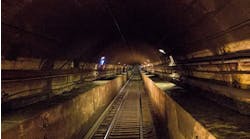BAI Canada and the Toronto Transit Commission on Dec. 10 officially launched free advertising-supported Wi-Fi at Bloor-Yonge and St George stations.
The Wi-Fi service, called Tconnect, provides subway riders at these interchange stations with the ability to access social media, email and browse the Internet on the platform and other public areas of the stations. These two initial stations are Toronto's busiest, accommodating approximately 25 per cent of the TTC's subway riders each weekday.
This announcement marks the first of many milestones in a larger wireless installation project that will help commuters stay connected throughout the TTC subway system. BAI Canada is building a shared wireless Wi-Fi and cellular infrastructure that allows wireless communications services for transit riders within underground subway stations. When complete, each station will host the Tconnect Wi-Fi service and be cellular-capable, ready for the GTA's cellular operators to sign on to the service.
"The wireless platform will allow transit riders access to real-time information on-the-go, including TTC alerts and updates," said TTC Chair Karen Stintz. "We are pleased to offer this service to our riders while generating substantial revenue to the TTC, which will help fund continued service improvements."
"The TTC is committed to enhancing the commuter journey and we promised to customers in our 2013 Customer Charter that two prototype subway stations would see wireless service by the end of this year," said TTC CEO Andy Byford. "We are proud to have met this commitment and delivered this robust, efficient network, and look forward to more announcements going forward."
BAI Canada has partnered with the Performance Content Group who has launched a new mobile and content marketing initiative with Starcom MediaVest Group and AOL Canada and its popular news site, The Huffington Post Canada. Riders will have access to on-the-go news stories from HuffPost Canada and messaging from Mondelez Canada, a leading snack company in Canada and makers of Stride and Dentyne gum, OREO cookies and Cadbury chocolate.
"The initial deployment of wireless services at Bloor-Yonge and St George stations marks the beginning of a change in the way TTC riders will experience their time underground," said Brian Jacks, CEO, BAI Canada. "Our global team has deployed some of the largest, most complex and state-of-the-art underground transit systems in the world and this installation demonstrates the expertise and commitment we have to bringing that to Toronto."
The official launch follows a two-week soft launch that began on Nov. 25, where customers at these stations had the opportunity to test the Tconnect Wi-Fi network first-hand. TTC riders met the soft launch with excitement, as they stayed connected to the Internet, social media, email and entertainment while waiting for trains.
"We were pleased at the success of the soft launch, and we look forward to expanding the reach of the Wi-Fi and cellular infrastructure throughout the subway system in the future," said Ken Ranger, Chief Operating Officer, BAI Canada. "Today marks the beginning of a new era for TTC customers. As we move into the next phase, we are excited to bring wireless and cellular infrastructure throughout the lower loop so Torontonians and visitors to Toronto can enjoy this enhanced experience in time for the Toronto 2015 Pan/Parapan Am Games."
BAI Canada and the TTC are delivering Wi-Fi and cellular infrastructure to all subway stations, covering all public areas including platforms, mezzanines, walkways and stairwells within the 65 current and planned underground stations. BAI Canada is paying the TTC $25 million over 20 years for the rights to install and operate the network. The second phase of the project is the extension of the cellular network within the TTC tunnels. All work is expected to be complete in three to four years.


